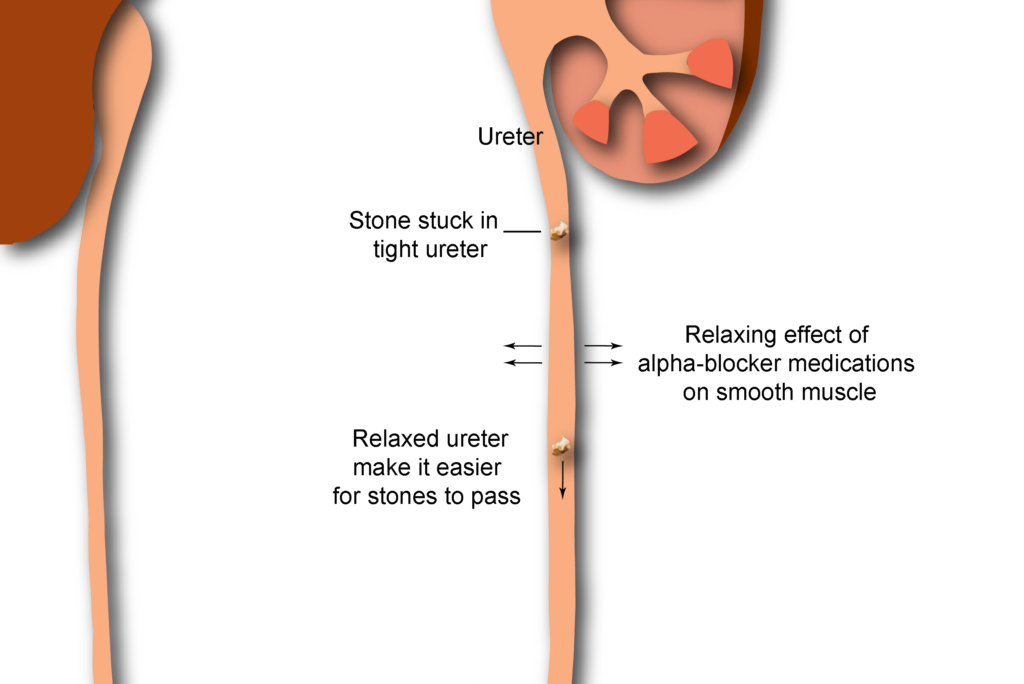If you are passing a kidney stone, your chances of successful stone passage are strongly related to stone factors including the size of the stone and its location. Small stones less than 4mm in size have an almost 80% chance of passage while larger stones measuring 8mm or greater have a less than 40% chance of spontaneous passage. Stones that are just starting to move out of the kidney have a 50% chance of passage while stones just about to drop into the bladder have an 80% chance of passage.
Wouldn’t it be great if you could take something to improve your chances of passing your stone? It turns out there are medications your doctor can prescribe for you which may be effective. This treatment is known as “medical expulsive therapy”. The most commonly used medication for this purpose is tamsulosin (Flomax). Other similar medications used to facilitate stone passage include alfuzosin, nifedipine, doxazosin, and terazosin. These medications are known as alpha-blockers and are normally used to relieve prostate obstruction in men (by relaxing smooth muscle in the prostate) or to lower blood pressure in patients with hypertension (by relaxing smooth muscle in blood vessels).
How do they work in stone passage?
The ureter is the hollow structure which transports urine from the kidney to the bladder. It has muscles which contract rhythmically in a process known as peristalsis. These movements normally help to speed the passage of urine down to the bladder. Medications to help pass stones may work by relaxing these ureteral muscles – resulting in a wider and less constricting ureter for stones to more easily pass through.

Illustration showing how medications may help kidney stones pass
.
In initial studies of patients taking these medications or placebo (sugar pill), those on the medications were 1.45 times more likely to successfully pass their stone. They also required less pain medication and passed their stones more quickly with fewer return trips to the hospital than patients taking placebo. Most early studies however involved small numbers of participants which made their findings less reliable.
Enthusiasm for this treatment approach waned when a large study from the UK published in July of 2015 cast doubt on effectiveness of medical expulsive therapy. The study included 1,167 participants who were given either placebo (sugar pill), tamsulosin, or nifedipine. The participants were then followed to see whether they passed their stone successfully. After 4 weeks, there were no differences seen, with 80% of those receiving placebo not needing further treatment, compared to 81% of those receiving tamsulosin and 80% of those receiving nifedipine. Pain scores, pain medication use, and time to stone passage also did not differ between the groups. Was this the end of medical expulsive therapy? Not quite – in medicine, more than one study is often needed to get a reliable answer and the question of whether medical expulsive therapy awaited additional research.
A subsequent analysis published by the Cochrane Library in 2018 pooled the findings from 15 studies with a combined total of 5,787 participants to try to get at a more definitive answer. In contrast to the UK study above, their combined results suggested kidney stone patients who took an alpha blocker medications were slightly more likely to pass their stones at a calculated relative risk of 1.16 (for each 1,000 patients who took an alpha blocker, 116 more passed their stones compared to those who took placebo (a sugar pill). Those who took an alpha blocker also seemed to more quickly pass their stones (3.4 days faster), have fewer hospitalizations (69 fewer hospitalizations per 1,000 patients), and take less pain medication. The effect of these medications seemed to be stronger for stones larger than 5mm. The downside of these medications was a slight increase in side effects (29 adverse events per 1,000 patients). These side effects included low blood pressure, fainting, racing heartbeat, and irregular heart beats.
The takeaway on medical expulsive therapy
The bottom line appears to be that medications used for medical expulsive therapy may modestly improve your chances of passing your stone and how quickly you pass your stone. They may also reduce the need for pain medications or hospitalization. They however may cause side effects in a small number of patients. The decision on whether to use these medications should ultimately be made with your medical provider and should take into account your chances of passing your stone spontaneously and whether you are at increased risk for serious consequences from any potential side effects.





